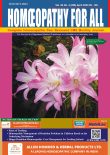The Future of Homoeopathy in India: A Vision for Healing and Harmony
Keywords:
Homoeopathy, science, gentle healing, holistic, approachAbstract
Homoeopathy, a science known for its gentle healing and holistic approach, has come a long way in India from being introduced by foreign missionaries in the 19th century to being regulated and promoted by the Government of India in the 21st century. Today, under the dynamic leadership of Prime Minister Shri Narendra Modiji India is witnessing a powerful resurgence of traditional and integrative medicine systems, including Homoeopathy, through the Ministry of AYUSH. This article presents a reflection on the journey of homoeopathy in India, but more importantly, it looks ahead-with confidence and optimism-towards a future where homoeopathy plays a central role in the nation's public health, research, education, and global outreach.
Downloads
References
1. NEET for BHMS & MD (Hom): Ensures high-quality student intake through a national entrance exam.
2. NEXT (National Exit Test): A licensing test to ensure standard clinical skills among graduates.
3. NIET (National Teacher's Eligibility Test): Compulsory for faculty appointments, ensuring teaching quality.
4. Revised Curriculum: Focus on Competency-Based Medical Education (CBME) with integration of modern tools.
5. Digital Transformation: Online portals for teacher registration, student tracking, inspections, and grievances.
6. Accreditation and Ethics: Formation of autonomous boards for UG/PG education, medical assessment, and ethics.




